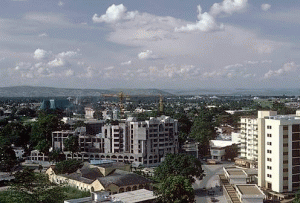 Brazzaville, Republic of Congo
Brazzaville, Republic of Congo
April 28th 2009
Brazzaville was a beautiful, even romantic, city once. At the end of the 1942 Hollywood movie Casablanca Humphrey Bogart and Claude Raines announce they are leaving for here to join the Free French Forces of General Charles de Gaulle. If they’d actually made it this far they would have found a small neat Art Deco and Bauhaus colonial city. They would not have found a downtown of buildings pock-marked by machine gun and RPG fire, bad experimental architecture from the 1960s, Soviet type ministry buildings from the 1970s, and a local attempt at a Pyongyang style 10 lane wide grande allee that proceeds for a short quarter mile in front of the presidency office and then peters out into the dusty pot holed streets of the rest of the city. But there are some shady streets, good cafes and patisseries, reasonable French restaurants and roof top clubs that play loud African music.
Brazzaville is a quiet and mostly peaceful place on the south bank of the Congo river at “Pool” as the large and wide lake the river becomes at this point is known. Across the river is Kinshasa, and the Democratic Republic of Congo, an even more dysfunctional and crazy place where the rumours are far more outlandish and invariably true, where you cannot walk the streets unmolested or worse and where the menace is more real than hidden, as here.
I have my routines now. I wake every morning, take a malaria pill, feel like being sick for half an hour, go for coffee and a pain-au-chocolate at a café, make some phone calls, set up the day’s meetings and then go back to the hotel and write up interview notes. Brazzaville is calm and comfortable—I’ve even become rather at home. The downtown is compact and one can walk about without bother, actually quite a luxury compared to other places where the appearance of a pale face elicits an immediate demand for money, a request to buy something or a conversation in broken English that leads to one or both of the former. But there is the inescapable heat—the tropical humidity and the impossibility of staying un-dishevelled.
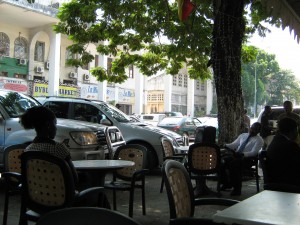 People are generally proper and well dressed. Those that can afford it—and apparently quite a few can in this petrol state—wear good business suits: matching ties and breast pocket mouchoirs good shoes and a hat. There are chalk stripe English banker’s suits, plaid jackets with bow tie, white linen three pieces with a panama and some other outfits too funky to describe. It is a visual shock every day and an accomplishment, although an impractical one, in this climate and this country which is hot and hard and it is a struggle not to feel sweaty as soon as one steps outside. But I pad about town and arrive at ministry offices and embassies feeling like a grub and am greeted by cool coiffed Congolese. It is the rainy season and it rains nearly every day. The bigger downpours can last for hours, even all night. It is like the biggest thunder burst of the summer that you’ve ever seen, it goes on that way for an hour and then gets twice as hard. The first night I was in a sidewalk café when the rain arrived, it got heavier and heavier; the street was a stream, then it was a river, then it was rapids knee deep and more. Cars keep driving through these rivers and the bigger SUVs do fine, though the little green taxis, low slung Corollas, struggle and some conk out and are flooded when the water gets too deep.
People are generally proper and well dressed. Those that can afford it—and apparently quite a few can in this petrol state—wear good business suits: matching ties and breast pocket mouchoirs good shoes and a hat. There are chalk stripe English banker’s suits, plaid jackets with bow tie, white linen three pieces with a panama and some other outfits too funky to describe. It is a visual shock every day and an accomplishment, although an impractical one, in this climate and this country which is hot and hard and it is a struggle not to feel sweaty as soon as one steps outside. But I pad about town and arrive at ministry offices and embassies feeling like a grub and am greeted by cool coiffed Congolese. It is the rainy season and it rains nearly every day. The bigger downpours can last for hours, even all night. It is like the biggest thunder burst of the summer that you’ve ever seen, it goes on that way for an hour and then gets twice as hard. The first night I was in a sidewalk café when the rain arrived, it got heavier and heavier; the street was a stream, then it was a river, then it was rapids knee deep and more. Cars keep driving through these rivers and the bigger SUVs do fine, though the little green taxis, low slung Corollas, struggle and some conk out and are flooded when the water gets too deep.
But the main thing on arrival is that you begin processing a mountain of information—much of it seemingly alarming and incredible. Crazy, unfortunate, shocking and discouraging things all go into the mix and this proceeds for a while until one thinks they’ve got a handle on what is really happening. Until the next meeting with another well placed well informed source who shatters your conclusions and forces you to dig, sift and decipher again until you think you know what is what, until the cycle begins anew.
The Congolese are polite and well mannered. They are also patient and long suffering. They need to be: all the problems are the same as when I was last here and in many respects worse. Theirs is an awful government, a bad but strong regime with a powerful army that came to power by force of arms in a civil war, draws support from one area that counts for less than 20% of the population and rules with disregard to responsibilities for the public, is corrupt, and spends oil money inefficiently on bad projects and purposes with little positive impact on peoples lives. A large group live lives of the super rich, have second and third homes in France and spend freely on luxury goods here and abroad. Everyone else struggles; there is worse public squalor than far poorer African countries I have seen. There are supermarkets with everything imported from France: a dozen kinds of paté, fillet de bouef, foie gras and whole sections for wines from Bordeaux, Alsace and the Languedoc. It is a struggle to find anything made or grown here. There is an atmosphere of artificiality, that nothing is rooted and natural or will last. Oil money supports all this and all this will be gone when the oil runs out. That would be a very good thing, it would at least return the country to something natural and honest and accountable.
All the embassy assessments I receive are negative—“worst case of malgovernance and elite contempt I’ve ever seen”; “most ethnically divided place in Africa”. It goes on, I’ve never heard diplomats speak so bluntly and with so much disgust for their host government. There is also an air of unreality here, nothing is at it appears. There will be an election in a few months but it will not be minimally free or fair. Politics are heavily controlled. Most of the opposition is boycotting; as few as 10% may actually vote. Underneath the surface calm there is a sense of menace, that all is not as it seems and all is not well. This is a police state and there are soldiers everywhere. Congolese are well educated and well informed. They are aware of the actual state of affairs and hold their politicians and their government in contempt. Instead they withdraw and debroulez-vous, take care of themselves. The government makes it known implicitly that the alternative to the status quo is violence and public memory of civil war is fresh, in the late 1990s and early 2000s when the army and government dissolved on ethnic grounds and educated urban people fled to the countryside to escape the army and the ethnic militias and lived off the land in the forest, something they were as used to as you or I.
For people here, many with good education and manners, the prospect of seeing modest gains and prosperity dissolve again into civil war is a hell they do not wish to return to. It is fear of that which supports the status quo—people make a calculation and put up with the awfulness if they are allowed to get on with their lives. Those politicians who cooperate are allowed access to all the riches of state and give life to the fantasy that all is well. There is an open press here and even quite frank opinion. It is one of the few sources of release. Journalists are not frequently harassed, although limits are known and those that cross these lines are acted against. Foreign journalists are not harassed either, though it is best to keep a low profile. I will write my stories and leave. Intelligence Unit does not translate well.
The president’s son is also someone not to cross here—and is spoken of with some fear as a violent man. Like most children of dictators, who are generally decadent losers, he has great power and privileges all of which will end when Papa quits the throne, and it is knowledge of that which seems to drive the worse excesses and capricious behaviour. If he and his bodyguards enter a night club it is best for you to leave. Right now he is most angry at Global Witness, an international anti-corruption NGO which has published his personal credit card spending details online involving $30,000 spent in a few days at the most expensive designer stores in Paris.
Another favoured target of presidential—and presidential family—wrath are the “Anglo-Saxon vulture funds”; American and British litigation firms that buy up defaulted Congolese debt on the secondary markets at a fraction of face value and then seek to collect at full value through the courts. The amounts involved are not enormous—within the government’s capacity to pay—and mostly seem to involve old debts to construction and trading companies for goods and services delivered and never paid for. The Vulture Funds are unlikely heroes: they are the ones doing the legwork to uncover the regime’s shady business dealings involving government oil trading contracts made to shell companies owned by regime figures and registered in the Virgin Islands and other tax havens, in which up to 13% of the value of oil from the state oil company disappears. It is the IMF that is most concerned about this, and has been playing a cat and mouse game with the government to get them to stop such practices and honestly deliver the full value of sale funds to public accounts where they can be verified and used for better purposes, health and education for example. But it is the Vulture Funds that really know how to needle the president and his family. When he last visited New York, the $250,000 hotel and room service bills of the presidential entourage—they apparently had a whole floor at the Waldorf Astoria and drank nothing but Crystal champagne—were published online. This is more money than Canada gave to Congo last year. Another court case is currently going on in France brought by an anti-corruption NGO in which the president is accused of money laundering and ill gotten gains after it was uncovered that he owns 10 different residences in elite districts of Paris. The president is furious at the bad press but mostly denounces “neo-colonial conspiracy, neo-liberalism and Anglo-Saxon capitalism”.
All of this is morally outrageous if you believe government has a duty and responsibility to manage public resources wisely and spend for good purposes. It also begs the question of what the end point of such evidently dysfunctional behaviour is. There are, after all, only so many Patek Philippe watches and Armani suits that a corrupt African leader can buy. The answer is to do with how political and economic power is wielded in an African state. Money obtained corruptly is a means to an end—to attain, entrench and hold power indefinitely requires that lots of people or groups need to be bought off or satisfied: there are private militias to run, politicians to reward or compromise and useless infrastructure to be built for areas that are part of the presidential powerbase to show that you are actually doing something. Such monies cannot be from the state budget or treasury, where accounts are open to scrutiny and the prying eyes of donors, the IMF, the public or transparency advocates—there must be an ongoing and near limitless source of secret and untraceable cash.
To academics African states are, in the jargon, “neo-patrimonial regimes” roughly equivalent to the absolutist monarchies of feudal Europe. Rulers have near absolute powers but must satisfy interest groups: the feudal aristocracy (the political elite and their families), the knighthood (the military or warlords), the peasantry (the public who will rebel if pushed too far) and foreign alliances (donors who will pull the plug if misgovernance and corruption becomes too blatant). It is managing the balance on the latter that is the challenge for donors countries. What level of good governance is sufficient to remain involved? If a government is stealing only a little bit and otherwise taking responsibilities seriously, that is a success. If it is stealing too much, blatantly disregarding its responsibilities and the country is in a wretched state or a downward spiral, that is the other end of the spectrum. But even that negative situation provides no easy answers for the international community. Withdrawal, cutting aid and diplomatic isolation can lead to even worse and more rapacious behaviour as an elite cannibalises its own economy and society (Zimbabwe, Burma) or experiences state collapse, civil disorder and humanitarian catastrophe (Democratic Republic of Congo, Somalia). Which is the better option if an entrenched government and a corrupt elite shows no interest in changing—should one stay involved and bargain and leverage for something better when it is possible? These are the awful choices donors must make.
In Congo the president has answered that question and made exactly that calculation, even an explicit kind of international bargain. He and his regime are corrupt and mismanage the economy, but the order and stability represented by a strong military ruler—he is an ex army colonel—is preferable to the horrors of civil war and state collapse which Congo experienced for a decade. The next election will be bad—I am reliably told there are 500,000 ghost voters identified in a population of 3.5m and more voters than people in some areas of the north where the president is from. But every embassy I have spoken to said that although they have a dialogue with the government about improving democratic accountability and governance, if it will not listen and there is a bad election, they see little choice other than to recognise the result that emerges as preferable to the greater evil of instability. Even a clean election, if it could be delivered, may simply expose the regime’s weakness and force it to a more openly oppressive stance. In other words, the president has called their bluff.
And so status quo ante will be the end result—a corrupt government will carry on as it has done; conditions will remain wretched, but not substantially worse than before, only that opportunities will be squandered and state riches consumed with little to show for it. There will not be democracy, but there will not be prosperity either. The other half of this negative scenario is that good governance, the rule of law, property rights, strong legal systems and public accountability and disclosure are just as unlikely, being inimical to elite interests which thrive on arbitrary power and the ability to over-ride independent institutions and checks and balances. Unfortunately, these are also exactly the conditions required for economic growth and poverty reduction.
***
April 29th
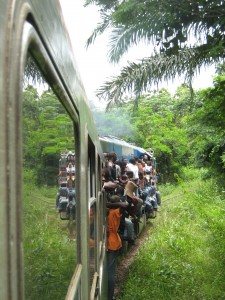 After the corruption, sin and farce of Brazzaville it is time to leave for the countryside, a point I make to do in every country. There is no wealth, good services or comfort there, but at least something more natural and rooted. The train leaves tomorrow morning for Dolisie, at the foot of the Mayombe Mountains. It will be good to get out. The train looks old and rather quaint but otherwise hides an un-benign story—the railway was built by the French with forced labour in the 1920s and 1930s at a cost of 20,000 lives. It takes about 15-20 hours to go the 350 kms to Dolisie, through forest and hills.
After the corruption, sin and farce of Brazzaville it is time to leave for the countryside, a point I make to do in every country. There is no wealth, good services or comfort there, but at least something more natural and rooted. The train leaves tomorrow morning for Dolisie, at the foot of the Mayombe Mountains. It will be good to get out. The train looks old and rather quaint but otherwise hides an un-benign story—the railway was built by the French with forced labour in the 1920s and 1930s at a cost of 20,000 lives. It takes about 15-20 hours to go the 350 kms to Dolisie, through forest and hills.
The first part, through The Pool region is the most difficult, the last and only part of the country where the rebels, “the Ninjas”, have not completely disarmed, but are largely peaceful and tolerated and are supposed to guard the train as it crosses their territory. Christian, my researcher, advises not to take anything valuable, remove watch, stow cell phone and valuables and have lots of coins and small denomination notes on hand.
April 30th train ride through Pool
The night before leaving I had begun to seriously question this venture, receiving three reports in a row all advising against: “It’s is a level 3 security zone, UN and other international personnel are banned from travelling. If you don’t have to go, don’t go, and if you do, then fly” (UN security chief); “Not something I would do, no not at all (aid worker). And most emphatically the young Congolese security guard at the NGO guest house where I stay and who has taken the train in the past and had an animated conversation with me in French:
“That place is crazy! The train goes through Pool, there are the Ninja rebles and plus thieves and crazy people are getting on at every station. Someone gets on board whose been smoking chomba and sees you, a white guy, you’ll have trouble. And what are you going to do? You’re alone. Hah! I wouldn’t do it. And plus your problems start soon as you get on at the station in Brazzaville—you don’t even have to wait to get to Pool. Why do you want to do this? You’re from a rich country you have money. That train is for poor people”.
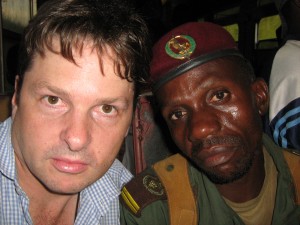 These were sobering assessments but with ticket in hand, preparations made and intent declared I didn’t think I could back out. And besides, a good challenge is always worth it and never as bad as it sounds. I arrived at the station in the morning, went to the head of security, introduced myself and explained my journey. He was a sparse and tough looking police colonel in green army fatigues who looked like he did not want more problems crossing his desk, including westerners who get into trouble. But he introduced me to the train’s chief of security, the sergeant-at-arms on the train, a Monsieur Biarit, and wished me on my way.
These were sobering assessments but with ticket in hand, preparations made and intent declared I didn’t think I could back out. And besides, a good challenge is always worth it and never as bad as it sounds. I arrived at the station in the morning, went to the head of security, introduced myself and explained my journey. He was a sparse and tough looking police colonel in green army fatigues who looked like he did not want more problems crossing his desk, including westerners who get into trouble. But he introduced me to the train’s chief of security, the sergeant-at-arms on the train, a Monsieur Biarit, and wished me on my way.
I took my seat in what had once been a first class carriage—now roughly what one might imagine a 3rd class Indian railway to look like: broken seats, areas with no seats, open windows, every space filled with people or piles of bananas, bags, boxes and freight and youths prowling up and down the aisles. I took a seat and tried to look inconspicuous. Except that you can’t when you are the only European on an African train; everyone notices you are there. In a semi or potentially threatening situation one begins to notice that consciously or not, you are building allies around you, like the nervous glances exchanged on a subway or street car when someone is acting up and no one knows how it’s going to end. I smiled, acted nonchalant and talked to a few people. Next to me sat an older, dignified man wearing Ray Charles style dark sunglasses. He was going to Dolisie also. He was disparaging about the train, which he used to work for, saying it used to be a beautiful service before the war.
The atmosphere was boisterous, young men hawking beer, crackers, pens, food and medicines that looked like they’d been pilfered from a government hospital, which is probably what they were. More beer was drunk, the conversation rose and a sense of expectancy began to build. The sense of menace faded as we cleared the shanty towns of Brazzaville, the crowds of hawkers and sellers walking through the train thinned out and we entered the green, green countryside of Pool region, otherwise known as The Pool. It is one of the poorest and most rundown areas in the country, bore the brunt of the war and has been the slowest to recover. As a stronghold of the opposition and of the Ninja rebels and their mystic leader, Pasteur Ntoumi, there is also a view that official neglect is a deliberate policy of punishment.
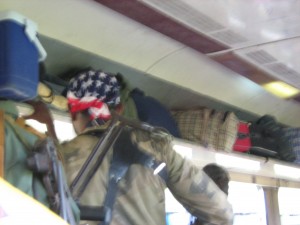 At Tsé-Tsé the rebels “the Ninjas” come aboard. A deal was made with them and the government to “guard” the train after bandit attacks—probably the Ninjas themselves—on the rail line had become serious enough that most service stopped. They wear military fatigues and mirror sunglasses, carry AK-47s rifles and swagger up and down the aisles extorting 500 francs here and there from passengers, but are otherwise fairly benign. They also engage the car in what amounts to minor political seminars, talking at length to—literally—captive audiences in Niari, long conversations in which the only words I can catch are the names of politicians, including French president Nicolas Sarkozy. I finally approach who seems to be their leader, wearing a US flag head bandana and carrying an automatic pistol in a shoulder holster. Feigning what I hope to be disarming naivety, I explain that I am a foreigner in his country and ask him who the Ninjas are and what they want. He does not smile or relax his soldierly bearing intended to display that he is in control, but otherwise he answers my questions, stating that they are fighting for liberty and opposing the tyranny of President Sassou-Nguesso and are on the train to protect the security of passengers (!). “We aren’t paid, it is a sacrifice”. By this point my friend (Idris is his name) is showing an interest in me and says that I must meet “the boss”, by that, meaning Pasteur Ntoumi, the mysterious mystic leader who led the rebel alliance during the war is believed by followers to have spiritual powers and to be the reincarnation of an anti-colonial leader of the 1930s, and remains holed-up in a remote area of Pool where he smokes chomba, has eight wives and 22 children and has a magnetic and universally acknowledged capacity to mobilise young men for war.
At Tsé-Tsé the rebels “the Ninjas” come aboard. A deal was made with them and the government to “guard” the train after bandit attacks—probably the Ninjas themselves—on the rail line had become serious enough that most service stopped. They wear military fatigues and mirror sunglasses, carry AK-47s rifles and swagger up and down the aisles extorting 500 francs here and there from passengers, but are otherwise fairly benign. They also engage the car in what amounts to minor political seminars, talking at length to—literally—captive audiences in Niari, long conversations in which the only words I can catch are the names of politicians, including French president Nicolas Sarkozy. I finally approach who seems to be their leader, wearing a US flag head bandana and carrying an automatic pistol in a shoulder holster. Feigning what I hope to be disarming naivety, I explain that I am a foreigner in his country and ask him who the Ninjas are and what they want. He does not smile or relax his soldierly bearing intended to display that he is in control, but otherwise he answers my questions, stating that they are fighting for liberty and opposing the tyranny of President Sassou-Nguesso and are on the train to protect the security of passengers (!). “We aren’t paid, it is a sacrifice”. By this point my friend (Idris is his name) is showing an interest in me and says that I must meet “the boss”, by that, meaning Pasteur Ntoumi, the mysterious mystic leader who led the rebel alliance during the war is believed by followers to have spiritual powers and to be the reincarnation of an anti-colonial leader of the 1930s, and remains holed-up in a remote area of Pool where he smokes chomba, has eight wives and 22 children and has a magnetic and universally acknowledged capacity to mobilise young men for war.
Dolisie May 1st
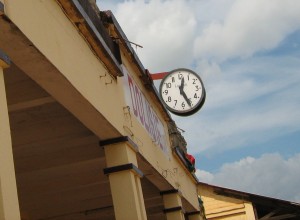 Dolisie is a small quiet and neat city in the Niari valley surrounded by green hills. The old French colonial city is still intact, with 1930s art deco buildings, the governor’s mansion, and the single story bungalows for civil servants. It is the place I’ve come to rest, get over a cold, escape the decadence of the capital, collect my thoughts and write. Mr Bouanga, the Ray Charles sunglasses man I’d met on the train shows me around. There is reserve to this man and a secret sadness as well. He had worked as a train inspector but lost his job eight years ago and has found nothing since. In Dolisie, he says, there are no jobs: only the government, the police and the army plus some stores owned by Lebanese traders. He is a man of some education, knows the French writer Emile Zola’s class warfare track Germinal and likes the Paris St Germaine football club. He took me to his home, a brick house with no windows on the outskirts of town up against a green hill that he says was his. I don’t know how they get by; they were poor, but not the poorest of the poor. The home had tin sheets for a roof and a cement floor. There was a concrete lined well with clean water and they had some avocado, papaya and mango trees. He cut some sugar cane and we ate it together, sitting on the ground, hitting it with a knife to soften the stalk and chewing the raw cane, which is sweet, and spitting out the chaff. He said during the war soldiers took all the tin sheets from the roof of his house and that he had to flee into the countryside to escape the fighting. The government army and the Angolans attacked the town from the air and the local defence militia was routed. He stayed in the countryside and later Pointe-Noire for a year. His current reduced circumstances and opportunity seemed like so many encounters one has here in this unstable badly governed tragic place where so many ambitions are frustrated and lives blighted. I left behind an envelope with 30,000 francs ($75) about a month wages.
Dolisie is a small quiet and neat city in the Niari valley surrounded by green hills. The old French colonial city is still intact, with 1930s art deco buildings, the governor’s mansion, and the single story bungalows for civil servants. It is the place I’ve come to rest, get over a cold, escape the decadence of the capital, collect my thoughts and write. Mr Bouanga, the Ray Charles sunglasses man I’d met on the train shows me around. There is reserve to this man and a secret sadness as well. He had worked as a train inspector but lost his job eight years ago and has found nothing since. In Dolisie, he says, there are no jobs: only the government, the police and the army plus some stores owned by Lebanese traders. He is a man of some education, knows the French writer Emile Zola’s class warfare track Germinal and likes the Paris St Germaine football club. He took me to his home, a brick house with no windows on the outskirts of town up against a green hill that he says was his. I don’t know how they get by; they were poor, but not the poorest of the poor. The home had tin sheets for a roof and a cement floor. There was a concrete lined well with clean water and they had some avocado, papaya and mango trees. He cut some sugar cane and we ate it together, sitting on the ground, hitting it with a knife to soften the stalk and chewing the raw cane, which is sweet, and spitting out the chaff. He said during the war soldiers took all the tin sheets from the roof of his house and that he had to flee into the countryside to escape the fighting. The government army and the Angolans attacked the town from the air and the local defence militia was routed. He stayed in the countryside and later Pointe-Noire for a year. His current reduced circumstances and opportunity seemed like so many encounters one has here in this unstable badly governed tragic place where so many ambitions are frustrated and lives blighted. I left behind an envelope with 30,000 francs ($75) about a month wages.
Leaving Dolisie by plane descended into farce. The boarding was so chaotic the head steward pulled a gun! But the really farcical thing was that the airport was brand new and opulent beyond measure, opened by the president the previous week, with marble floors, Provençal style sand stone, cream painted walls, halogen spots lights, fancy new check-in counters and departure and VIP lounges that could be the airport of a small city in southern France. Although no city in France would have a VIP lounge of that size, almost as big as the main airport building itself, with gold leaf chairs. The farce is that such a grand structure is hardly needed in this town that has two flights a day and where bigger priorities—water and health for example—go begging. But this is the way Congo’s government conceives development progress to be—services and infrastructure for the elite.
Waiting at the airport an elderly distinguished looking man begins peering over my shoulder at the title of my book: “The Failure of Democracy in Congo”, a depressing account written by an American academic of how the democratic experiment of the early 1990s descended into civil war. My new friend, M. Ferdinand M’boukou, definitely has something to say about this and opens a conversation in which he spoke at length about local politics beginning from the 1940s onwards. He concludes saying he would like me to meet some people who “really knew” what was happening in the country. We exchange contacts and I thought little more of it.
When I landed at Brazzaville airport a man was waiting for me behind the customs counter and asked for me by name. He spoke in hushed tones, would not reveal who he was—beyond that he was a Mason—or who I was to meet, but said he was instructed to make introductions for me to see some “senior” people. Hot and grubby from seven hours at Dolisie airport I begged off for the moment but agreed to set up a meeting later in the week. It was a Graham Greene type experience but also typical of the odd and unusual encounters one has nearly every day here in this unstable badly governed place, some beautiful and inspirational, others simply ridiculous and absurd.
***
Frederick, the French director of an NGO that is in charge of blowing up land mines and old ordinance for the Congolese army, and whom I’ve met, invites me to stay at his office cum residence compound. With a bad hotel room costing an arm and a leg in Brazzaville I readily accept. It opens some interesting doors. Frederick is locally well connected, charming, vivacious, well experienced, speaks six languages—including vernacular English from the Britain of the 1980s where he worked as a chef—is warm, outgoing, hard working, a competent manager and a bon vivant who loves good food, good wine, beautiful women and does not shy away from a fight or a challenge. He knows everyone, is capable, big hearted, funny and well read. He has a large goatee, a pot belly, some cool suits, and looks like he could be a passable Hercule Poirot or a younger Peter Ustinov with some Hells Angels and Dennis Hopper thrown in. I am also his new play friend and we go out nearly every night. Twice a day he calls me into his office for impromptu debates on global capitalism, the difference between faith and reason, the output of the great French writers in between scanning his i-Tunes for music and watching You Tube videos.
I suspect he also likes having me around to talk politics and exchange Africa experiences but also to give him someone else other than his two project staff to talk to—Anne, the dour young German administrator, and Dominique an ex French navy munitions expert—both of whom he has worked in the same office and lived in the same house with for a year. I think they are secretly all sick of each other and I am a new and gratefully accepted buffer. I now have a room, a desk and internet access. These are unspeakable luxuries for someone on the road living and working out of a duffel bag. I am to see their project in action tomorrow—four tonnes of munitions blown up at a demolition site outside the city.
Brazzaville May 4th
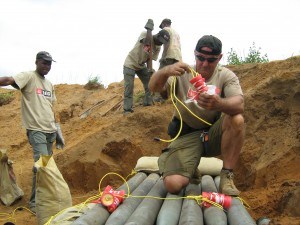 I leave with Dominique the French munitions expert at 630AM—after being kept out late by Frederick where he alternatively entertained and terrorised the giggling waitresses at a Chinese restaurant who did not speak French, English or any other language apart from Mandarin. We arrive at a Congolese Army base where we met with the army counterpart team and load the truck with rockets—122mm Soviet surface to surface missiles—and begin driving out of the city through the outer shanty towns. We are making progress when all traffic stops and an army truck approaches driving south in the north bound lane; it is full of soldiers of the presidential guard, in smart purple berets.
I leave with Dominique the French munitions expert at 630AM—after being kept out late by Frederick where he alternatively entertained and terrorised the giggling waitresses at a Chinese restaurant who did not speak French, English or any other language apart from Mandarin. We arrive at a Congolese Army base where we met with the army counterpart team and load the truck with rockets—122mm Soviet surface to surface missiles—and begin driving out of the city through the outer shanty towns. We are making progress when all traffic stops and an army truck approaches driving south in the north bound lane; it is full of soldiers of the presidential guard, in smart purple berets.
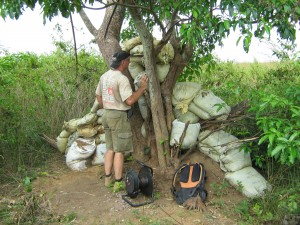 We arrive at the demolition site 100km north of the city on a big empty plain. The ambulance vehicle makes a quick circuit to see that there are no people and no livestock within the 1km perimeter of the blast zone. The crew unloads the rockets into a large pit with Dominique supervising. His leadership over the group is total, they respect him for his skills—26 years in the French navy’s special forces, equivalent to the US Navy SEALS—and no nonsense attitude. In his early 50s, he runs five miles a day, is tough as nails and could strangle me in my sleep. To me he is completely disparaging about the Congolese army and the Congolese, appalled at what he regards as the poor level of professionalism and disgusted that the wealthy and well cared for officer corps shows so little interest and that a country and an army that has plenty of money does so little with it. Although the project is disposing of surplus munitions for the army, they do not take advantage of the technical skills available to set up a munitions inventory system, or even take advantage of Dominique’s explosives expertise. The officer who is the project counterpart, Colonel Nijaki, is not here today and never is; his family lives in France and he is there much of the time as well. I later learn that he is a cousin of the president.
We arrive at the demolition site 100km north of the city on a big empty plain. The ambulance vehicle makes a quick circuit to see that there are no people and no livestock within the 1km perimeter of the blast zone. The crew unloads the rockets into a large pit with Dominique supervising. His leadership over the group is total, they respect him for his skills—26 years in the French navy’s special forces, equivalent to the US Navy SEALS—and no nonsense attitude. In his early 50s, he runs five miles a day, is tough as nails and could strangle me in my sleep. To me he is completely disparaging about the Congolese army and the Congolese, appalled at what he regards as the poor level of professionalism and disgusted that the wealthy and well cared for officer corps shows so little interest and that a country and an army that has plenty of money does so little with it. Although the project is disposing of surplus munitions for the army, they do not take advantage of the technical skills available to set up a munitions inventory system, or even take advantage of Dominique’s explosives expertise. The officer who is the project counterpart, Colonel Nijaki, is not here today and never is; his family lives in France and he is there much of the time as well. I later learn that he is a cousin of the president.
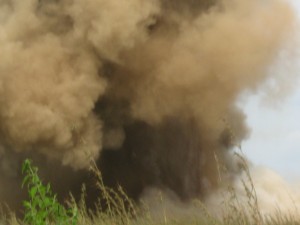 Dominique places the explosive charges and we walk away unwheeling a long wire to a sandbag emplacement under a tree 350m away. The detonation went off with a huge bang and a mushroom cloud, and I snapped a picture of that, and some more of the sky filling with dust when Dominique yelled to get down again; there was the sound of something whizzing towards us. A piece of shrapnel passed over head and landed in the bush a few yards behind our sand bag emplacement. We returned to the hole and found a crater. Later, back at the army base, after unloading and debriefing, there are some North Korean soldiers on a technical assistance mission milling around at the base. There is an international arms embargo on North Korea at this time and Congo will be rebuked in the coming months when a ship full of North Korean weaponry, bound for Congo, is halted in South Africa. I thought of going over to them and making crazy-in-the-head gestures and repeating Kim Jong Il’s name, but thought better of it. Slipping a DVD copy of Team America may have been a better idea.
Dominique places the explosive charges and we walk away unwheeling a long wire to a sandbag emplacement under a tree 350m away. The detonation went off with a huge bang and a mushroom cloud, and I snapped a picture of that, and some more of the sky filling with dust when Dominique yelled to get down again; there was the sound of something whizzing towards us. A piece of shrapnel passed over head and landed in the bush a few yards behind our sand bag emplacement. We returned to the hole and found a crater. Later, back at the army base, after unloading and debriefing, there are some North Korean soldiers on a technical assistance mission milling around at the base. There is an international arms embargo on North Korea at this time and Congo will be rebuked in the coming months when a ship full of North Korean weaponry, bound for Congo, is halted in South Africa. I thought of going over to them and making crazy-in-the-head gestures and repeating Kim Jong Il’s name, but thought better of it. Slipping a DVD copy of Team America may have been a better idea.
***
Brazzaville May 5th
Today I meet the mysterious Congolese politicians. Monsieur Damba agrees that we will meet at a neutral spot, the Hotel Olympique, and he arrives in an expensive looking lime green linen suit with matching gingham check shirt and tie. He reveals little, apart from the fact that he is a Mason and an ex airline pilot and we take a taxi arriving at a large residence with high walls and a gate house with guards outside; the home is huge, four stories and many rooms, and two BMWs parked in the forecourt. We are ushered into a hexagonal building in the garden with full length windows on all sides. The room has a seating area with expensive leather chairs around a cut glass table. There is a large, presidential sized desk, and a long table with Louis XIV style gold lint chairs with red crushed velvet seats.
In the corner is standing Mathias Dzon, the leader of an opposition alliance and their joint candidate in the next presidential elections, one of the smartest and most ambitious politicians in the country. He is short, composed has a twinkle in his eye, and looks every inch the politician and presidential aspirant. This is not the first time we’ve met, the last was in London 7 years earlier when he was minister of finance and gave me untruthful answers about his government secretly contracting new foreign debt against oil sales in contravention of its agreement with the IMF. I mention this to him and he remembers our meeting. But before we can start the blaring television has to be turned off—yes, the great man watches day time TV, French crime dramas—and there is a moment of farce as the flunky, M. Damba, struggles with the remote and only succeeds in turning the volume up before M. Dzon takes it from his hands.
I do some quick mental footwork and make a little intro speech in French of why I am in Congo and why I’d like to speak to him, and then make up a list of questions. I have to say he was very impressive. Smart, well spoken and quite determined not to accept a bad election or the sense of inevitability that the president does so much to create. He would be a good president, but not probably the one the country will get. When I arrive home Mr M’boukou calls again, asks how the meeting went and says he wants to organise the next one with the leader of the other opposition party: Mr Ange Edouard Poungui.
Brazzaville May 7th
I felt reasonably well informed when I arrived here but now looking back on three weeks of information gathering, meetings with ambassadors, government officials, politicians, army officers, aid workers, local journalists, taxi drivers, bar tenders and anyone else I meet, I realise how much more there is to know, how much information is not in the public domain, that I am only just reaching the more interesting levels of access and that one has to constantly dig, uncover and sift the different sources—many of them quite contradictory from well informed people—to come up with judgements. The judgements are not positive; this is a badly governed place, a police state in fact, that allows a small elite to squander great wealth, that does not manage its economy well or create opportunities for its people who wish to get ahead but struggle. The Congolese are being prepared for more of the same if they are forced to accept another bad election and another seven year presidential term. Several people I speak to hint that things may actually turn out badly, that people are very angry and fed up, that a violent election is possible and that it is not even clear who or what will provoke it—either public anger or the shadowy army and security people whose influence rises when there is conflict and wanes when there is not. A local journalist working for a French TV station I spoke with today backs this up. We meet in a downtown café, and he quickly displaces us to somewhere “more private” to speak. He asks for my opinion—backed by three ambassadors—that a bad election will be accepted at home and abroad as the better alternative to war or instability, but then grabs my arm and stops me quick. “You are speaking to ambassadors, they talk to the government, to ministers, those are the views they mirror. I know what the people on the street think and they are not going to accept this forever”. Yes, forever is a long time.
When I get home there is an email from a European ambassador, a compassionate man who seems deeply melancholy about the wretched state of the country and also says that he thinks the omens are bad and that some nasty surprises for the election are possible. He has just returned from an official visit with the President to open a road in Pool funded by the EU. But what really shocks and moves him is the enormous display of force—helicopter gunships overhead, hundreds of gun toting soldiers, armoured personnel carriers—to protect the president on a visit 60km from the capital. In Congo such displays have a purpose, they are a warning to the population. In the last presidential election in 2002 a full scale insurgency broke out in the middle of the campaign between the army and Ntoumi’s Ninjas, it was something minor that escalated quickly into something major and was taken further by army people. The insurgency raged for a full year in The Pool and Ntoumi was never caught.
Brazzaville May 14th
Today I am to give a lecture at the US Cultural Centre, a weekly forum open to the public, mostly younger Congolese who wish to practice English, with the topic being the Congolese economy, and all the self-inflicted reasons for why it is going no where. When I arrive the deputy ambassador is preparing packages of books—gifts for sponsored students who have passed through English courses or have been to the US on scholarships. There are copies of the works of Mark Twain, Nathaniel Hawthorne, Henry James, Earnest Hemingway and John Irving. I feel gratified by this—the literature seems to point to a very appropriate American message: optimism, hope and belief in change. The audience is mostly young Congolese who speak English with influences of American rap and hip hop—together with a sprinkling of expats. I felt strongly that it was important to give this talk—that these young people should know the mechanics of why and how their economy can be managed badly to the benefit of a small elite and to the exclusion of conditions that will allow an open growing prospering but still poor country move ahead. Looking at all these smart and ambitious young people it is with regret that I know most of them will see their ambitions and opportunities blighted. After the talk there was an hour of very tough questions from the audience followed by applause. I nearly cried.
The American embassy crowd took me out for dinner after at “Le Hippo-Campe” a Vietnamese restaurant that is their hang out. One of the Americans was working up-country with the Aspinal Foundation combating poaching, particularly of gorillas and said that he’d succeeded in having several officials arrested for complicity, including a judge. Someone else said that he had a price on his head and that we should move out of the line of fire from the entrance to the restaurant.
Afterword Frederick took me to a good French restaurant where we sat at the bar and drank for a long time with the owner and some people who work with security consulting in both Congos—Russian, Belgian and Congolese. Their stories were interesting, to say the least. There was a small bar area, good decor, and a garden with a band playing Congolese cover versions of international pop music, including a localised version of Guantanamera.
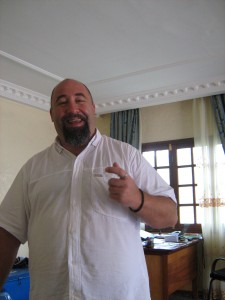 Frederick spent a long time demonstrating to the bartenders—with great showmanship—how to make new cocktails, including a concoction that includes Kalula, Cointreau, white rum and Amarula. I have had time to consider this very unusual and rather beautiful man, who has adopted me as a project, put me up, introduced me to everyone and opened his heart and his story. He would be a compelling story subject himself, like a modern day Henri de Monfried or Arthur Rimbaud easy in almost any language, adventurseome, gracious, big hearted, egotistical, vain, generous, idealistic, passionate, cynical, a hedonist with a dozen lovers. Large, balding, goateed, an ex-Rugby player, London chef, aid worker, traveller, fighter and adventurer. And then there are the stories: running a transportation business in Somalia, captured by the militias, tied up, stripped naked in the street, and being prepared to be killed when he somehow talked his way out of it, claiming his Mother had been Palestinian. There are pictures of him working in Afghanistan with a beard and a white Shalmar Kameez, looking like a Taliban, with the UN in Kosovo wearing body armour, others with lovers, pictures of his daughters in France, and one with a wild cheetah he befriended in Kenya. Tough, gentlemanly, practical, sentimental, joyful, generous, vulnerable. I sense a need for validation. Today I overhead him crying to a lover overseas—a Slovenian doctor—spurning him. But by the evening he is in fine form and talking up the girls in the bar. I still don’t know why he wants to have me around—but every night we go out, we eat and drink copiously, share stories and he tells me yet more incredible, outrageous, disclosures.
Frederick spent a long time demonstrating to the bartenders—with great showmanship—how to make new cocktails, including a concoction that includes Kalula, Cointreau, white rum and Amarula. I have had time to consider this very unusual and rather beautiful man, who has adopted me as a project, put me up, introduced me to everyone and opened his heart and his story. He would be a compelling story subject himself, like a modern day Henri de Monfried or Arthur Rimbaud easy in almost any language, adventurseome, gracious, big hearted, egotistical, vain, generous, idealistic, passionate, cynical, a hedonist with a dozen lovers. Large, balding, goateed, an ex-Rugby player, London chef, aid worker, traveller, fighter and adventurer. And then there are the stories: running a transportation business in Somalia, captured by the militias, tied up, stripped naked in the street, and being prepared to be killed when he somehow talked his way out of it, claiming his Mother had been Palestinian. There are pictures of him working in Afghanistan with a beard and a white Shalmar Kameez, looking like a Taliban, with the UN in Kosovo wearing body armour, others with lovers, pictures of his daughters in France, and one with a wild cheetah he befriended in Kenya. Tough, gentlemanly, practical, sentimental, joyful, generous, vulnerable. I sense a need for validation. Today I overhead him crying to a lover overseas—a Slovenian doctor—spurning him. But by the evening he is in fine form and talking up the girls in the bar. I still don’t know why he wants to have me around—but every night we go out, we eat and drink copiously, share stories and he tells me yet more incredible, outrageous, disclosures.
The next morning I woke up prepared to fly out to Johannesburg and all its comforts and spend the week writing up and moving on to Mozambique, which is peaceful and easy and beautiful and well governed and has a 1000 miles of beaches. It seemed too easy. There is unfinished business here. I cancelled my flight and hotel reservation and told Frederick I was heading over the river to DRC instead. He didn’t seem surprised.
We said goodbye at the river port, the beach, on the Brazzaville side. He was prying me about what I might write about on his project—he is vain and probably disappointed it is not more about him—but he did want the “peace consolidation” aspects of his project written up, getting unstable munitions out of circulation. When I joked that it would be a shame if the army hurt itself while shooting its own people—the most likely use of all this weaponry—he was silent and hurt.
I do not like being at the Brazzaville river port, the beach. It is almost as chaotic as the Kinshasa side, but mostly because it always reminds me of the “Beach Case”, a war time atrocity in 1999 when refugees were repatriated by the UNHCR from DRC and delivered into government hands. The army separated all the young men of military age—353 of them—who were never seen again. There has been an international war crimes case going on over this and the government always manages to duck away from it.

I loved that job in BZ, we were able to take it quite far! Otherwise i wasn’t hurt at all, just thoughtful about the work on hand and a bit sad to see you leave and not at all around the wish for more personal “coverage “. The real shame would have been for a depot to explode in a crowded area (remember all depots were in towns)
The project was what mattered and what needed to be put forward as much as possible and in its best possible light to have any chance of sustainability.
“Don’t know why he wants to have me around”… but for the same reasons you invited me to Canada. It fits within our intellectual understanding of growth, opposites and likeness, appetite for intelligent debates, where proselytism isn’t a goal, but where views can absorb others and progress. because any conversation can be limitless.
On a different note, Dominique died last year in Sri Lanka while demining in a village.
Maybe you can send me your ex girlfriend’s address for me to forward my CV to.
wishing you well… as always
Fred
Frederick, my dear friend.
Agreed, on all counts. Thanks, for taking it all in good spirit. Very sorry to hear that we have lost our Valkerie; he was true to himself. Will send you Kristine’s email shortly.
Regards from Goma.
D